
Quake III Arena is a 1999 multiplayer-focused first-person shooter developed by id Software. The third installment of the Quake series, Arena differs from previous games by excluding a story-based single-player mode and focusing primarily on multiplayer gameplay. The single-player mode is played against computer-controlled bots. It features music composed by Sonic Mayhem and Front Line Assembly founder Bill Leeb.

Tom Clancy's Rainbow Six is a 1998 tactical shooter video game developed and published by Red Storm Entertainment for Microsoft Windows, with later ports for the Nintendo 64, PlayStation, Mac OS, Game Boy Color, and Dreamcast. It is the first installment in the Rainbow Six series. Based on the Tom Clancy novel of the same name, the game follows Rainbow, a secret international counterterrorist organization, and the conspiracy they unravel as they handle a seemingly random spike in terrorism.
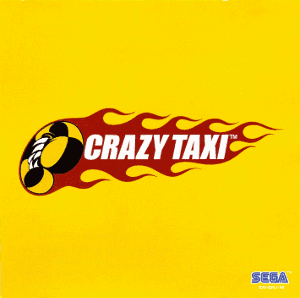
Crazy Taxi is a racing video game developed by Hitmaker and published by Sega. It is the first game in the Crazy Taxi series. The game was first released in arcades in 1999 and then was ported to the Dreamcast in 2000. Gameplay is based on picking up taxi customers and driving to their destination as quickly as possible. Reception to Crazy Taxi has been mostly positive. It was ported to other platforms numerous times, including the PlayStation 2 and GameCube by Acclaim in 2001, and then Windows in 2002.
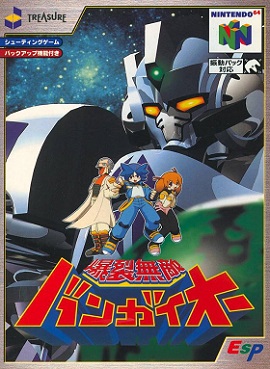
Bangai-O is a multidirectional shooter developed by Treasure and released in 1999 on the Nintendo 64 in Japan. It was ported to the Dreamcast worldwide shortly after with some gameplay changes and updated graphics and audio. The game places the player in control of a weaponized mech that can hover across large stages and fire at enemies all around them. The player must reach the end of each stage and defeat the boss, while avoiding hazards scattered across the map such as enemy mechs and gun turrets.

Battlefield 1942 is a 2002 first-person shooter video game developed by Digital Illusions CE and published by Electronic Arts for Microsoft Windows and Mac OS X. The game can be played in single-player mode against the video game AI or in multiplayer mode against players on the Internet or in a local area network. It is a popular platform for mod developers, with many released modifications that alter the gameplay and theme.

ChuChu Rocket! is an action puzzle game developed by Sonic Team and published by Sega. Released for the Dreamcast in 1999, it was the first game for the system to support online console gaming. Players must place arrows on a board to lead mice into escape rockets while avoiding cats. The game features single-player modes in which a player must save all the mice on a board, and a multiplayer mode in which players battle to collect the most mice.

Crazy Taxi 2 is a 2001 racing video game and the second installment of the Crazy Taxi series. It was originally released for the Dreamcast, and was later ported to the PSP as part of Crazy Taxi: Fare Wars in 2007. It is the last Crazy Taxi game to be released for the Dreamcast after it was discontinued on March 31, 2001.

Crazy Taxi 3: High Roller is the third video game in Sega's Crazy Taxi series. It was originally released for the Xbox, followed by an arcade release under the title Crazy Taxi: High Roller for the Sega Chihiro game board and then a Microsoft Windows release. It expands on the previous two games with additional locations, taxis and other features.

Unreal Tournament is a first-person arena shooter video game developed by Epic Games and Digital Extremes. The second installment in the Unreal series, it was first published by GT Interactive in 1999 for Windows, and later released on the PlayStation 2 and Dreamcast by Infogrames in 2000 and 2001, respectively. Players compete in a series of matches of various types, with the general aim of out-killing opponents. The PC and Dreamcast versions support multiplayer online or over a local area network. Free expansion packs were released, some of which were bundled with a 2000 re-release: Unreal Tournament: Game of the Year Edition.

Tony Hawk's Pro Skater 2 is a skateboarding video game developed by Neversoft and published by Activision. It is the second installment in the Tony Hawk's series of sports games and was released for the PlayStation in 2000, with subsequent ports to Microsoft Windows, Game Boy Color, and Dreamcast the same year. In 2001, the game was ported to the Mac OS, Game Boy Advance, Nintendo 64, and Xbox. The game was later ported to Windows Mobile and Windows Phone devices in 2006 and to iOS devices in 2010.
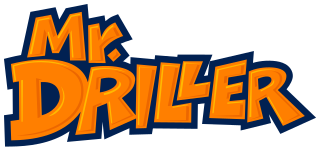
Mr. Driller is a puzzle video game franchise created by Yasuhito Nagaoka and Hideo Yoshizawa for Namco. The eponymous first game was released in 1999 for arcades and several home consoles, such as the PlayStation. Gameplay in the series consists of controlling Susumu Hori, the titular Mr. Driller, or one of his friends and destroying colorful formations of blocks to make it to the bottom of a well. In order to survive, players need to collect air capsules to replenish their depleting oxygen and avoid being crushed by falling blocks.
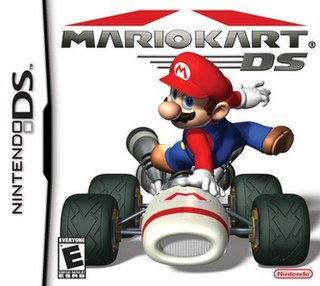
Mario Kart DS is a 2005 kart racing video game developed by Nintendo EAD Group No. 1 and published by Nintendo for the Nintendo DS handheld game console. It was released in November 2005 in North America, Europe, and Australia, and on December 8, 2005, in Japan. The game was re-released for the Wii U's Virtual Console in North America and PAL regions in April 2015 and in Japan in May 2016.
A cooperative video game, often abbreviated as co-op, is a video game that allows players to work together as teammates, usually against one or more non-player character opponents (PvE). Co-op games can be played locally using one or multiple input controllers or over a network via local area networks, wide area networks, or the Internet.

Crazy Taxi is a series of racing games developed by Hitmaker and published by Sega. It was first available as an arcade video game in 1999, then released for the Dreamcast console in 2000. It is the third best-selling Dreamcast game in the United States, selling over a million copies. The game was later ported to the PlayStation 2, GameCube, and IBM PC compatibles with sequels also appearing on the Xbox, Game Boy Advance, and PlayStation Portable systems.

Puyo Puyo! 15th Anniversary is a puzzle video game of the Puyo Puyo series, developed by Sonic Team and published by Sega for the Nintendo DS in 2006, as well as PlayStation 2, PlayStation Portable, and Wii in 2007. It has not been released outside of Japan for any consoles. This is the first Puyo Puyo game to be released on the Wii console.

Daisenryaku is a series of war strategy video games by SystemSoft and SystemSoft Alpha in Japan. The series debuted in Japan in 1985 with Gendai Daisenryaku exclusively for the NEC PC-98.
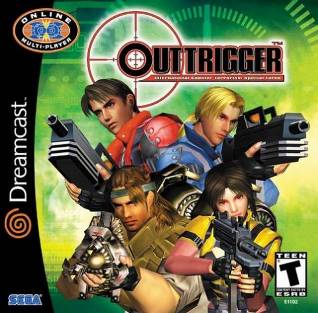
Outtrigger is a first/third-person shooter video game developed by Sega AM2 for the Sega NAOMI arcade cabinet and the Dreamcast. The game was originally released in 1999 for the arcades and was later ported over to the Dreamcast in 2001. The player character of Outtrigger is a member of an anti-terrorist group, and can be chosen between default characters with different specialties or a custom character, and can utilize a number of power-ups. Reception to Outtrigger was generally positive, praising the gameplay and mechanics, though criticizing the removal of online play in the European version of the game.

NBA 2K1 is a 2000 sports video game developed by Visual Concepts and published by Sega. It was the first NBA 2K game to feature online multiplayer and the first game to feature street courses instead of playing a game inside the arena in the first game, famous street courts such as The Cage, Rucker Park, Franklin Park, and Goat Park.
Half-Life is a series of first-person shooter games developed and published by Valve, beginning with the original Half-Life, released for Windows in 1998. The earliest known canceled Half-Life game dates to 1999. Between Half-Life 2: Episode Two (2007) and Half-Life: Alyx (2020), Valve canceled at least five Half-Life games, including Half-Life 2: Episode Three, a version of Half-Life 3, and games by 2015, Inc., Junction Point Studios and Arkane Studios.

Battlefield 2042 is a first-person shooter, developed by DICE and published by Electronic Arts. The twelfth main installment in the Battlefield series, it was released on November 19, 2021, for PlayStation 4, PlayStation 5, Windows, Xbox One, and Xbox Series X/S. Unlike previous games in the series, Battlefield 2042 is solely multiplayer and does not have a single-player campaign. It features support for cross-platform play, a first in the series. Battlefield 2042 received mixed reviews from critics and a negative reception from players for its technical issues, lack of features, and certain changes to the gameplay. The game failed to meet the sales expectations of Electronic Arts.



















